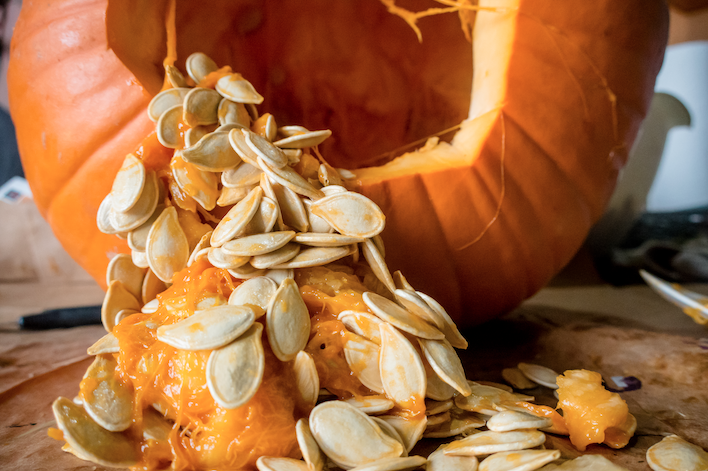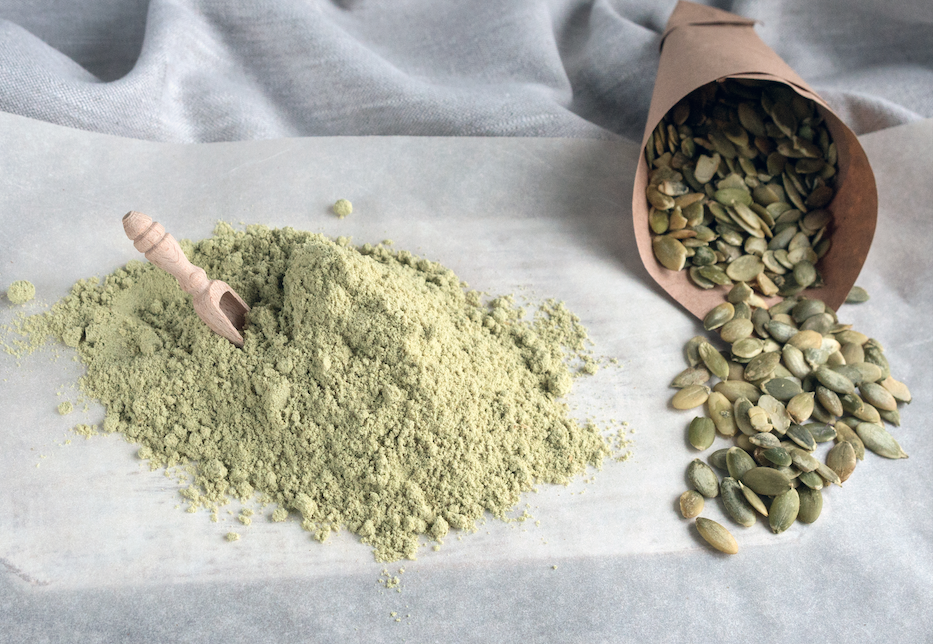Is Pumpkin Seed Protein The Next Breakthrough In Vegan Protein?

If there were ever a time for people to focus on their health and wellness, it’s now. With the desire for improved health, we see more people working to improve their body composition and overall fitness level. Protein intake has become an essential part of this goal. Protein not only supports a lean body but also is needed for a strong immune system, providing the materials needed to repair tissues and keep immune cells strong.1 Traditionally, dairy and animal protein sources have long been the most popular choices when it comes to protein powder, but, over the past few years, we here at Muscle Insider have seen a drastic increase in the use of plant-based protein sources among athletes as many people are turning toward more of a plant-based lifestyle. Traditional diets for fitness-focused individuals no longer come in one shape and size. Many athlete-focused individuals are adopting vegan, vegetarian, dairy-free and flexitarian type diets. The result is that more and more quality sources of plant proteins are available. These plant proteins are rich in antioxidants and essential vitamins and minerals, are loaded with fibre, and usually have trace amounts of slow-burning complex carbohydrates. With so many choices of plant-based protein powders available, it can be hard to know which one to choose and if one is better than another for your dietary goals and needs.
Vegetarian Protein Powders – Pumpkin Leads the Way!
 Along with the growth of plant-based nutrition, we’ve seen supplement companies turn to pea, soy, hemp or rice as popular protein sources. Although pea and rice protein have emerged over the past five to six years as the front-runners, both of these protein sources do have their drawbacks. In most cases, you’ll find pea and rice combined together in one product; this is in order to get a complete amino acid profile. Pea protein has a low biological value for protein, while rice protein can have a high lead content.
Along with the growth of plant-based nutrition, we’ve seen supplement companies turn to pea, soy, hemp or rice as popular protein sources. Although pea and rice protein have emerged over the past five to six years as the front-runners, both of these protein sources do have their drawbacks. In most cases, you’ll find pea and rice combined together in one product; this is in order to get a complete amino acid profile. Pea protein has a low biological value for protein, while rice protein can have a high lead content.
 One protein source, which often gets overlooked, is that from pumpkin seeds (botanical source: Cucurbita). Pumpkin seeds have been recognized as one of the top health foods in the world and for good reason. Pumpkin seed protein is a highly digestible vegan protein that is low allergen and loaded with nutrients, including vitamins and minerals, healthy fats and much more.
One protein source, which often gets overlooked, is that from pumpkin seeds (botanical source: Cucurbita). Pumpkin seeds have been recognized as one of the top health foods in the world and for good reason. Pumpkin seed protein is a highly digestible vegan protein that is low allergen and loaded with nutrients, including vitamins and minerals, healthy fats and much more.
The benefits associated with pumpkin seeds are numerous:
- Pumpkin seeds contain high levels of zinc and magnesium,2 which have been found to help improve heart health, hormone levels, immunity and sleep quality and to reduce stress.
- Pumpkin seeds have been recognized as one of the best plant-based sources of omega-3s and other essential fatty acids.3
- High levels of antioxidants are found in pumpkin seeds, including vitamins E and A, lycopene and carotenoids.4 10 These antioxidants in pumpkin seeds are thought to have blood glucose lowering, cardio protective and cholesterol lowering properties, to name a few.5
- Research has even suggested that pumpkin seeds specifically have been associated with a reduced risk of many cancers including breast,6 prostate, and colon cancer, as well as supporting urinary tract health.
Traditional Pumpkin Seed Protein Contain “Dregs”
It wouldn’t be fair to only highlight the benefits of pumpkin seed protein without addressing the potential negatives that can arise. If we look at one of the most popular products in the marketplace today, we will find a dreg-extracted protein. This refers to a process involving the collection of small particles that settle at the bottom of some liquids such as pumpkin seed oil. Dreg-extracted protein is, simply put, a by-product of oil production.
From this process, quality becomes a concern for many reasons:
- There is very little protein left in dregs, which makes it difficult to guarantee any specific level of protein content.
- Because oil factories usually don’t produce one type of oil, there can be a high risk for contamination from microorganisms (e.g., E. coli, salmonella) and/or heavy metals (e.g., lead).
- Oil factories focus on retaining nutrients within the oil-produced, dreg-extracted protein may not contain many of the original vitamins, minerals and essential fatty acids.
- The flavour profile of dreg-extracted protein tends to be extremely poor, while the mouth-feel is coarse and even dry. Blending dreg-extracted protein with other protein sources can ruin the taste and texture of the entire formula.
NNB Nutrition's TruSeed P - A Better Pumpkin Seed Protein
 Science has found a solution, thanks to the research team over at NNB Nutrition. They have created TruSeed P, which is a premium protein extracted from pumpkin seeds. TruSeed P is made from selected whole pumpkin seeds. NNB Nutrition has developed a proprietary extraction method to keep protein content above 75 percent and retain as many nutrients as possible. Developers are confident that the taste and mouthfeel of TruSeed P is unmatched. Specifications and quality assurance are assured with every batch produced.
Science has found a solution, thanks to the research team over at NNB Nutrition. They have created TruSeed P, which is a premium protein extracted from pumpkin seeds. TruSeed P is made from selected whole pumpkin seeds. NNB Nutrition has developed a proprietary extraction method to keep protein content above 75 percent and retain as many nutrients as possible. Developers are confident that the taste and mouthfeel of TruSeed P is unmatched. Specifications and quality assurance are assured with every batch produced.
 NNB manufacturing process allows TruSeed P to maintain a high percentage of the nutrients naturally occurring in pumpkin seeds. Just a 50-gram serving of TruSeed P would provide your entire recommended dietary intake for zinc and magnesium. These two minerals are essential to health. Zinc has been shown to be involved in many processes in the body, including immune function, hormone production, as well as to play a role in eye, skin and heart health.7Meanwhile, magnesium has been shown to boost exercise performance, muscle contraction, heart health, help reduce inflammation, reduce feelings of stress and anxiety and even help with sleep.8
NNB manufacturing process allows TruSeed P to maintain a high percentage of the nutrients naturally occurring in pumpkin seeds. Just a 50-gram serving of TruSeed P would provide your entire recommended dietary intake for zinc and magnesium. These two minerals are essential to health. Zinc has been shown to be involved in many processes in the body, including immune function, hormone production, as well as to play a role in eye, skin and heart health.7Meanwhile, magnesium has been shown to boost exercise performance, muscle contraction, heart health, help reduce inflammation, reduce feelings of stress and anxiety and even help with sleep.8
In addition to these benefits, TruSeed P includes many other unique bonuses:
- It contains over 75% protein content, with high bioavailability and digestibility.
- It has incredible solubility in water, even without using a blender.
- It’s rich in essential fatty acids (EFAs), antioxidants and fibre, which may provide benefits for heart and liver health.9
- It’s a complete source of protein providing all of the essential amino acids2.
- It is kosher, halal, and non-GMO, contains low to no allergens and is organic certified.
- It’s manufactured in a BRC-certified facility.
- It’s free of additives, glyphosate, herbicides, and pesticides.
- No more green-grit, allowing for a great taste with a smooth and creamy texture.
Whether you’re following a vegan, vegetarian or even a flexitarian lifestyle, the high protein and dietary fibre content, along with the low fat content found in TruSeed P makes for a great option for individuals looking to improve overall body composition and health, without unnecessary carb or fat calories from other plant-based protein sources.
How to Use NNB Nutrition's TruSeed P
 NNB recommends consuming one to three servings per day of 5 to 30 grams of TruSeed P per serving. You can easily add it to your favorite smoothie or protein-based recipes such as protein bars, bites or pancakes! Each 25-gram serving of TruSeed P provides 19.6 grams of protein, only 3.9 grams of carbohydrates, no sugar and only 0.2 grams of fat, with a total of 96 calories.
NNB recommends consuming one to three servings per day of 5 to 30 grams of TruSeed P per serving. You can easily add it to your favorite smoothie or protein-based recipes such as protein bars, bites or pancakes! Each 25-gram serving of TruSeed P provides 19.6 grams of protein, only 3.9 grams of carbohydrates, no sugar and only 0.2 grams of fat, with a total of 96 calories.
NNB Nutrition's TruSeed P Pumpkin Seed Protein Solubility
 To learn more about TruSeed P and other innovations from the NNB team, be sure to visit the NNB Nutrition website.
To learn more about TruSeed P and other innovations from the NNB team, be sure to visit the NNB Nutrition website.
Scientific References:
- Torre-Villalvazo I, et al. Protein intake and amino acid supplementation regulate exercise recovery and performance through the modulation of mTOR, AMPK, FGF21 and immunity. Nutr Res. 2019. 72:1-17.
- Glew RH, et al. Amino acid, mineral and fatty acid content of pumpkin seeds (Cucurbita spp) and Cyperus esculentus nuts in the Republic of Niger. Plant Foods Hum Nutr. 2006. 61(2): 51-6.
- Raczyk M, et al. Roasting pumpkin seeds and changes in the composition and oxidative stability of cold-pressed oils. Acta Sci Pol Technol Ailment. 2017. 16(3): 293-301.
- Nawirska-Olszańska A, et al. Characteristics of antioxidant activity and composition of pumpkin seed oils in 12 cultivars. Food Chem. 2013. 139(1-4): 155-61.
- Pateel S, Rauf A. Edible seeds from Cucurbitaceae family as potential functional foods: Immense promises, few concerns. Biomed Pharmaco. 2017. 91: 330-7.
- Zaineddin AK, Buck K, Vrieling A, et al. The association between dietary lignans, phytoestrogen-rich foods, and fibre intake and postmenopausal breast cancer risk: a German case-control study. Nutr Cancer. 2012;64(5):652-65. Epub 2012 May 16.
- Saper RB, Rash R. Zinc: an essential micronutrient. Am Fam Phys. 2009. 79(9): 768.
- Alawi AM, et al. Magnesium and human health: perspectives and research directions. Int J Endocrinol. 2018.
- Amin MZ, et al. Comparative study on nutrient contents in he different parts of indigenous and hybrid varieties of pumpkin (Cucurbita maxima Linn.). Heliyon. 2019. 5(9): e02462.
- Butinar B, Bucar-Miklavcic M, Mariani C et al. New vitamin E isomers (gamma- tocomonoenol and alpha-tocomonoenol) in seeds, roasted seeds and roasted seed oil from the Slovenian pumpkin variety 'Slovenska golica'. Food Chemistry. 2011. 128(2): 505-512.

